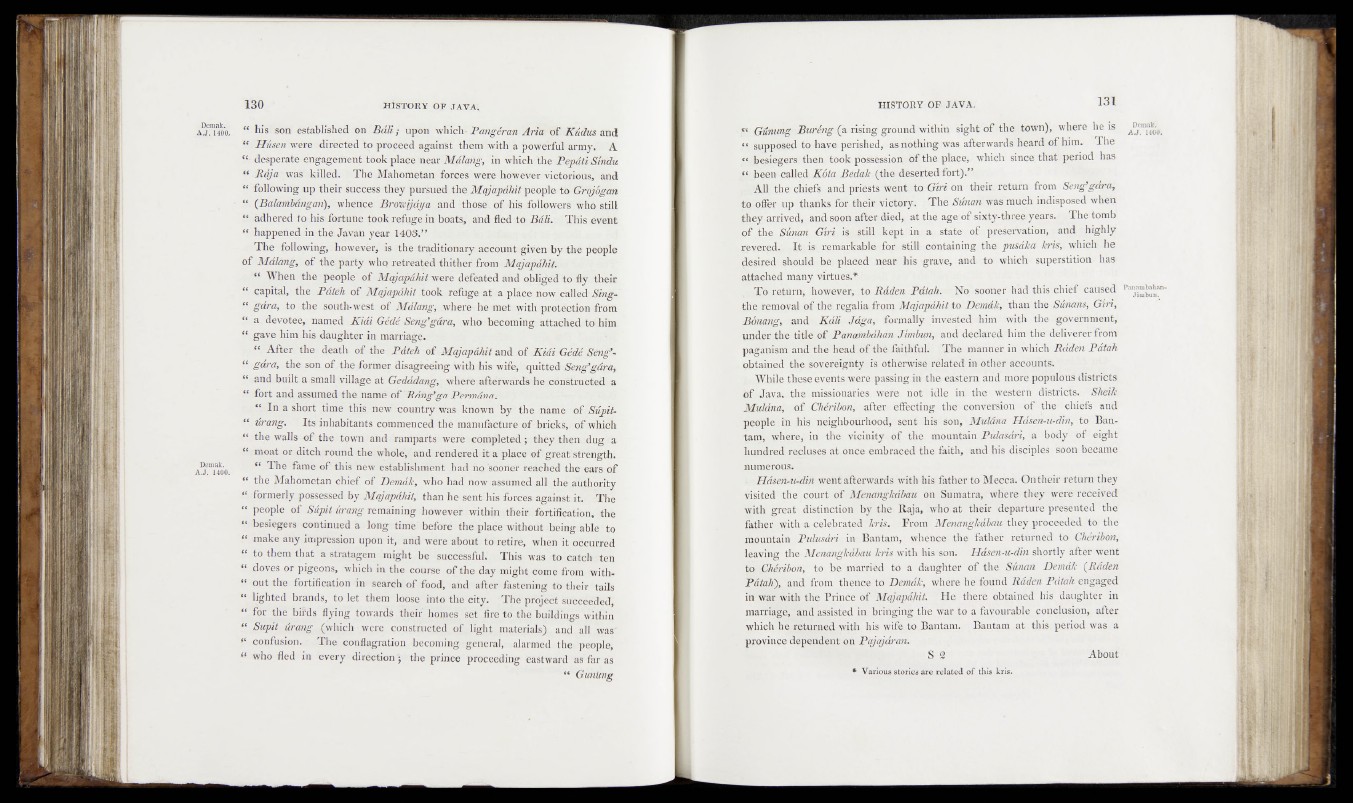
Demak.
a .j . iioo. a his son established on B a l iupon which- Pangéran Aria' of Kidus and
“ Huseri'were directed ‘to proceed against them with a powerful®rmy.' A
desperate' engagement took place near Mdhhg, in which'Sbhe PepdtUSiridu
“ Baja' was dpiMe’d. The Mahometan forces were however victorious,i and
“ '«following ,up theif success they pursued the.Majapdhit people:toïGfbjógan
(Balarnt&ngan), whence, i Br<mijaya Nand Ithosel ofohis followers, who still
.^..adhered forhis; fortune took refuge.in boats, and fled to Bdli.~ This event
“ happened in'thé-Javan year'1403.” i .
The following, t-howeafêr^^is ^ïhe traditionary aceóuntegi-venby the people
of Mdlatng, of the party who retreateddhitberifrom Mqjapdfiitr i
“ Whendfhet,people' of Mqjapdhit were defeated and ohligeiTto -fly their
“ capital,*fhe Patch of Mqjapdhit took,-refuge at *a ,pMce now^calledt^big-
“ gdra, to the soiith-west of Malang, jwherfe he'metT.'^itltJprdtéefeion-from
“ a devotee, named Kidi Qédé Sertg’gdra, who "becomings 'attaèhéd-tQVhim,
“ gave him.his daughter in marriage. ■
- “ After, the death of the Pdteh ol-Majapdhit andM-sKidv^GMe^Seng’-
“ gdra, the son of. the former disagreeing with his« wife, quitted “Seng-gdrqj
“ and built a small village at Gedadang, where^afterwardè-heteónstrulatedha
fort and assumed the namé e£iRdng’ga Permdrun
; W ïn a short time this, new tcèuntry was knowh^y^th^m^ma??:ofiriiS'iy)/V-
“ drang. ■ Its inhabitants commenced'the manufaeture'dfibrieksjKef,which
the walls of the town and ramparts were completed; 3 the,yu%§nt;dug fh
moat or ditch round the whole,' and rendered i t aTpldce idf?gf èaï^trength.
I The fame of this hew establishment bad' nojMeÊOffe'r reache'dJ-the* ear s > of
“ the Mahometan chief of Demdk, who had" now-assumed all the^adthority
m formerly .possessed by Mqjapdhitthan he sent! his forces,against.it. Thé
“ people of Supit urang remaining however within their, fortification, the
“ .besiegers continued a long time* before the placéwithout ibteing',able*to
“ make any impression upon it, and were about ito' retire, when ifcd3cutored
f? ib them1 that a stratagem .might be successful. This was toicatclh. teti
“ doves or pigeons, which in the course of the day-might come-sfrora with-
“ oqt the fortification in search of food, and after fastening t'o their tails
“ lighted brands, to let them loose into the city. ‘.The project succeeded,
“ for the birds flying towards their homes set fire to the buildings within
.“ Supit drang ..(.which were constructed of light materials) and all pras'
f confosion. The .conflagration becoming-general, 'alarmed the people,
“ who fled in -every direction; the prince proceeding eastward as far as
“ Gunting
.« Gunung Buréng (à, rising ground within sight of the town), where he is
supposed toyhave perished,, as nothing was afterwards heard of him. The
/Vbegiegers. then ,'töok. possessionfof-the place, which rince that period has
; been called Kóta Be,dak (ithe ‘deserted fort).”*
(l^rAU ||®> chiefs and prié^stvfent to Gîrkbn their'return, from Seng’gara,
tftiOffer up thanks for their victory, ö&e Sman was much indisposed when
they.arrived,^andsoop after, died,- at the age of sixty-three years. The tomb
of.|he Sûnan Givi is still..kept'in a state of preservation, and highly
revered^. - It is*, remarkable, -for- -stilh containing the pusdka kris, which*, ihe
dësirëd should b.ei placed near, his grave, and to which superstition has
l^tehed many virtues.*
,. .Toyretar*n$ however,-, to Baden Pdtah. No sooner had this chief caused
É ! removal of the regalia from Mqjapdhit to Demdk, than'the Sunans, Girt,
Bónang, and Kali Jdga,\ formally .invested him with the government,
under the title- of Panambdhan Jimbun, and declared him the deliverer from
paganis®"and the head of the faithful. The manner in which Baden Pdtah
obtained therèöyèié%nty<::is otherwise related in other accounts.
; IWÎlÛlë these events were passing in' the: eastern and more populous districts
of Java-,, the imissionai'ies were not' idle in the - westeth districts. Sheik
Mtcldna, -of Chéribm, after effecting the -conversion of the chiefs- and-
people in his neighbourhood, sent his son, Mulâna Hdsen-u-din, to Bantam,
Where,' in - the. vicinity. of the mountain Pulasdri, a body of eight
hundred recluses at once embraced the faith, and his disciples Soon became
numerous.
r Haseii-u-din went afterwards with his father to Mecca. On their return they
visited* the court of Menangkdbau on Sumatra, where they wére received
with great distinction by the. Raja, who at their 'departure presented ' the*
father«With a celebrated! 7cm. Trom Menangkdbau theÿ proceeded -to* ihe
mountain Pulusdri in Bantam, whence, the father returned' to Chéribm,
leaving the Menangkdbau kris with his*son. Hdsen-u-din shortly after went
to Chéribon, to be married to a daughter of the Sûnan Demdk (Baden
Patah\ and from thence to Demdk, where!hè" foiînd Râdên Pdtah engaged
in war with the Prince of Mqjapdhit. He there obtained his daughter in
marriage, and assisted in bringing the war to a favourable conclusion, after
which he returned with his wife to Bantam. Bantam at this period was a
province dependent on Pajqjdran.
S 2 About
* Various stories are related of this kris.
Demak.
A J. 1400.
Panambahan
Jimbtra.